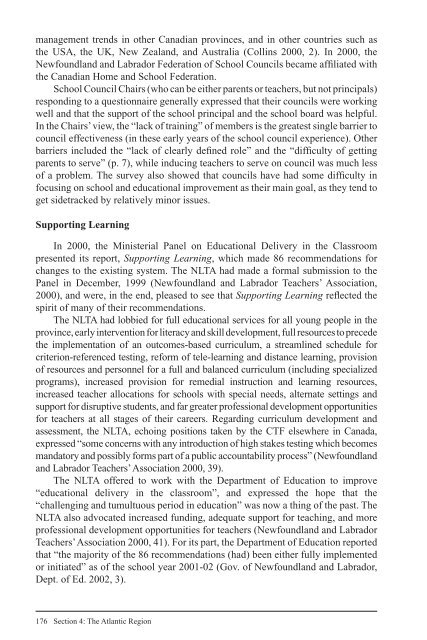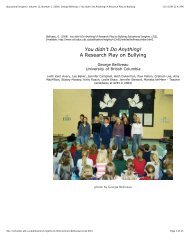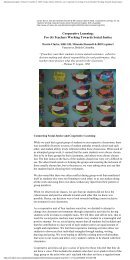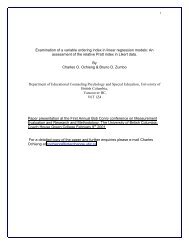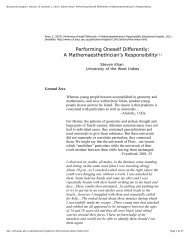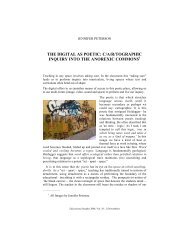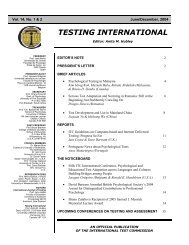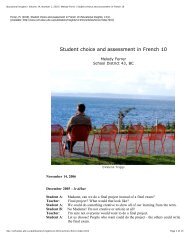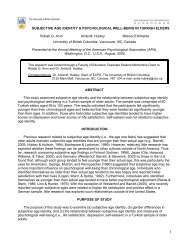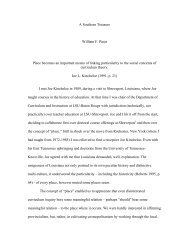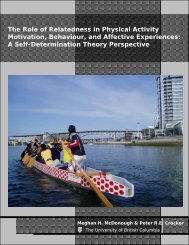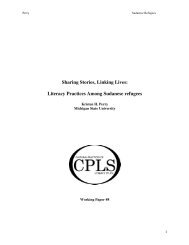The evolution of professionalism - Centre for Policy Studies in ...
The evolution of professionalism - Centre for Policy Studies in ...
The evolution of professionalism - Centre for Policy Studies in ...
You also want an ePaper? Increase the reach of your titles
YUMPU automatically turns print PDFs into web optimized ePapers that Google loves.
management trends <strong>in</strong> other Canadian prov<strong>in</strong>ces, and <strong>in</strong> other countries such as<br />
the USA, the UK, New Zealand, and Australia (Coll<strong>in</strong>s 2000, 2). In 2000, the<br />
Newfoundland and Labrador Federation <strong>of</strong> School Councils became affi liated with<br />
the Canadian Home and School Federation.<br />
School Council Chairs (who can be either parents or teachers, but not pr<strong>in</strong>cipals)<br />
respond<strong>in</strong>g to a questionnaire generally expressed that their councils were work<strong>in</strong>g<br />
well and that the support <strong>of</strong> the school pr<strong>in</strong>cipal and the school board was helpful.<br />
In the Chairs’ view, the “lack <strong>of</strong> tra<strong>in</strong><strong>in</strong>g” <strong>of</strong> members is the greatest s<strong>in</strong>gle barrier to<br />
council effectiveness (<strong>in</strong> these early years <strong>of</strong> the school council experience). Other<br />
barriers <strong>in</strong>cluded the “lack <strong>of</strong> clearly defi ned role” and the “diffi culty <strong>of</strong> gett<strong>in</strong>g<br />
parents to serve” (p. 7), while <strong>in</strong>duc<strong>in</strong>g teachers to serve on council was much less<br />
<strong>of</strong> a problem. <strong>The</strong> survey also showed that councils have had some diffi culty <strong>in</strong><br />
focus<strong>in</strong>g on school and educational improvement as their ma<strong>in</strong> goal, as they tend to<br />
get sidetracked by relatively m<strong>in</strong>or issues.<br />
Support<strong>in</strong>g Learn<strong>in</strong>g<br />
In 2000, the M<strong>in</strong>isterial Panel on Educational Delivery <strong>in</strong> the Classroom<br />
presented its report, Support<strong>in</strong>g Learn<strong>in</strong>g, which made 86 recommendations <strong>for</strong><br />
changes to the exist<strong>in</strong>g system. <strong>The</strong> NLTA had made a <strong>for</strong>mal submission to the<br />
Panel <strong>in</strong> December, 1999 (Newfoundland and Labrador Teachers’ Association,<br />
2000), and were, <strong>in</strong> the end, pleased to see that Support<strong>in</strong>g Learn<strong>in</strong>g refl ected the<br />
spirit <strong>of</strong> many <strong>of</strong> their recommendations.<br />
<strong>The</strong> NLTA had lobbied <strong>for</strong> full educational services <strong>for</strong> all young people <strong>in</strong> the<br />
prov<strong>in</strong>ce, early <strong>in</strong>tervention <strong>for</strong> literacy and skill development, full resources to precede<br />
the implementation <strong>of</strong> an outcomes-based curriculum, a streaml<strong>in</strong>ed schedule <strong>for</strong><br />
criterion-referenced test<strong>in</strong>g, re<strong>for</strong>m <strong>of</strong> tele-learn<strong>in</strong>g and distance learn<strong>in</strong>g, provision<br />
<strong>of</strong> resources and personnel <strong>for</strong> a full and balanced curriculum (<strong>in</strong>clud<strong>in</strong>g specialized<br />
programs), <strong>in</strong>creased provision <strong>for</strong> remedial <strong>in</strong>struction and learn<strong>in</strong>g resources,<br />
<strong>in</strong>creased teacher allocations <strong>for</strong> schools with special needs, alternate sett<strong>in</strong>gs and<br />
support <strong>for</strong> disruptive students, and far greater pr<strong>of</strong>essional development opportunities<br />
<strong>for</strong> teachers at all stages <strong>of</strong> their careers. Regard<strong>in</strong>g curriculum development and<br />
assessment, the NLTA, echo<strong>in</strong>g positions taken by the CTF elsewhere <strong>in</strong> Canada,<br />
expressed “some concerns with any <strong>in</strong>troduction <strong>of</strong> high stakes test<strong>in</strong>g which becomes<br />
mandatory and possibly <strong>for</strong>ms part <strong>of</strong> a public accountability process” (Newfoundland<br />
and Labrador Teachers’ Association 2000, 39).<br />
<strong>The</strong> NLTA <strong>of</strong>fered to work with the Department <strong>of</strong> Education to improve<br />
“educational delivery <strong>in</strong> the classroom”, and expressed the hope that the<br />
“challeng<strong>in</strong>g and tumultuous period <strong>in</strong> education” was now a th<strong>in</strong>g <strong>of</strong> the past. <strong>The</strong><br />
NLTA also advocated <strong>in</strong>creased fund<strong>in</strong>g, adequate support <strong>for</strong> teach<strong>in</strong>g, and more<br />
pr<strong>of</strong>essional development opportunities <strong>for</strong> teachers (Newfoundland and Labrador<br />
Teachers’ Association 2000, 41). For its part, the Department <strong>of</strong> Education reported<br />
that “the majority <strong>of</strong> the 86 recommendations (had) been either fully implemented<br />
or <strong>in</strong>itiated” as <strong>of</strong> the school year 2001-02 (Gov. <strong>of</strong> Newfoundland and Labrador,<br />
Dept. <strong>of</strong> Ed. 2002, 3).<br />
176 Section 4: <strong>The</strong> Atlantic Region


